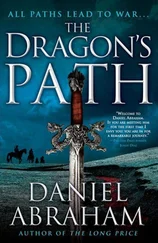Daniel Abraham - THE
Здесь есть возможность читать онлайн «Daniel Abraham - THE» весь текст электронной книги совершенно бесплатно (целиком полную версию без сокращений). В некоторых случаях можно слушать аудио, скачать через торрент в формате fb2 и присутствует краткое содержание. Жанр: Фэнтези, на английском языке. Описание произведения, (предисловие) а так же отзывы посетителей доступны на портале библиотеки ЛибКат.
- Название:THE
- Автор:
- Жанр:
- Год:неизвестен
- ISBN:нет данных
- Рейтинг книги:3 / 5. Голосов: 1
-
Избранное:Добавить в избранное
- Отзывы:
-
Ваша оценка:
- 60
- 1
- 2
- 3
- 4
- 5
THE: краткое содержание, описание и аннотация
Предлагаем к чтению аннотацию, описание, краткое содержание или предисловие (зависит от того, что написал сам автор книги «THE»). Если вы не нашли необходимую информацию о книге — напишите в комментариях, мы постараемся отыскать её.
THE — читать онлайн бесплатно полную книгу (весь текст) целиком
Ниже представлен текст книги, разбитый по страницам. Система сохранения места последней прочитанной страницы, позволяет с удобством читать онлайн бесплатно книгу «THE», без необходимости каждый раз заново искать на чём Вы остановились. Поставьте закладку, и сможете в любой момент перейти на страницу, на которой закончили чтение.
Интервал:
Закладка:
Eiah looked down at the battered leather satchel, and then up at him,
the question in her eyes.
"There's too much to fit in my sleeves," she said. "I'd clank like a
toolshed every time I waved."
"That's not why you carry it," he said. "It's so that people see a
physician and not your father's daughter. You've always been like that."
It was his little punishment for her return to her own rooms. There had
been a time when she'd have resented the criticism. That time had passed.
"Good night, Parit-kya," she said. "It was good to see you again."
He took a pose of farewell, and then walked with her to the door. In the
courtyard of his house, the autumn moon was full and bright and heavy.
The air smelled of wood smoke and the ocean. Warmth so late in the
season still surprised her. In the north, where she'd spent her
girlhood, the chill would have been deadly by now. Here, she hardly
needed a heavy robe.
Parit stopped in the shadows beneath a wide shade tree, its golden
leaves lined with silver by the moonlight. Eiah had her hand on the gate
before he spoke.
"Was that what you were looking for?" he asked.
She looked back, paused, and took a pose that asked for clarification.
There were too many things he might have meant.
"When you wrote, you said to watch for unusual cases," Parit said. "Was
she what you had in mind?"
"No," Eiah said. "That wasn't it." She passed from the garden to the street.
A decade and a half had passed since the power of the andat had left the
world. For generations before that, the cities of the Khaiem had been
protected by the poets-men who had dedicated their lives to binding one
of the spirits, the thoughts made flesh. Stone-Made-Soft, whom Eiah had
known as a child with its wide shoulders and amiable smile, was one of
them. It had made the mines around the northern city of Machi the
greatest in the world. Water-Moving-Down, who generations ago had
commanded the rains to come or else to cease, the rivers to flow or else
run dry. Removing-the-Part-That-Continues, called Seedless, who had
plucked the seeds from the cotton harvests of Saraykeht and discreetly
ended pregnancies.
Each of the cities had had one, and each city had shaped its trade and
commerce to exploit the power of its particular andat to the advantage
of its citizens. War had never come to the cities of the Khaiem. No one
dared to face an enemy who might make the mountains flow like rivers,
who might flood your cities or cause your crops to fail or your women to
miscarry. For almost ten generations, the cities of the Khaiem had stood
above the world like adults over children.
And then the Galtic general Balasar Gice had made his terrible wager and
won. The andat left the world, and left it in ruins. For a blood-soaked
spring, summer, and autumn, the armies of Galt had washed over the
cities like a wave over sandcastles. Nantani, Udun, Yalakeht,
Chaburi-Tan. The great cities fell to the foreign swords. The Khaiem
died. The Dai-kvo and his poets were put to the sword and their
libraries burned. Eiah still remembered being fourteen summers old and
waiting for death to come. She had been only the daughter of the Khai
Machi then, but that had been enough. The Galts, who had taken every
other city, were advancing on them. And their only hope had been Uncle
Maati, the disgraced poet, and his bid to bind one last andat.
She had been present in the warehouse when he'd attempted the binding.
She'd seen it go wrong. She had felt it in her body. She and every other
woman in the cities of the Khaiem. And every man of Galt.
Corruptingthe-Generative, the last andat had been named.
Sterile.
Since that day, no woman of the cities of the Khaiem had borne a child.
No man of Galt had fathered one. It was a dark joke. Enemy nations
locked in war afflicted with complementary curses. Yourhistory will be
written by half-breeds, Sterile had said, or it won't be written. Eiah
knew the words because she had been in the room when the world had been
broken. Her own father had taken the name Emperor when he sued for
peace, and Emperor he had become. Emperor of a fallen world.
Perhaps Parit was right. Perhaps she had taken to her vocation as
single-mindedly as she had because she wanted to be something else.
Something besides her father's daughter. As the princess of the new
empire, she would have been a marriage to some foreign ward or king or
lord incapable of bearing children. The degraded currency of her body
would have been her definition.
Physician and healer were better roles to play. Walking through the
darkened streets of Saraykeht, her robes and her satchel afforded her a
measure of respect and protection. It was poor form to assault a healer,
in part because of the very real chance of requiring her services one
day. The toughs and beggars who haunted the alleys near the seafront
might meet her eyes as she walked past, might even hail her with an
obscenity or veiled threat, but they had never followed her. And so she
didn't see that she had any need of the palace guard. If her work
protected her, there was no reason to call upon her blood.
She stopped at the bronze statue of Shian Sho. The last emperor gazed
out wistfully over the sea, or perhaps back through the ages to a time
when his name had been important. Eiah pulled her robe tight around
herself and squatted at his metalwork feet, waiting for the firekeeper
and his steamcart. In daytime, she would have walked the streets north
and uphill to the palaces, but the seafront wasn't the worst part of
Saraykeht. It was safer to wait.
To the west, the soft quarter was lit in its nightly festival. To the
east, the bathhouses, the great stone warehouses, rarely more than
half-filled now. Beyond that, the cohort houses of the laborers were
darker, but far from unpeopled. Eiah heard a man's laugh from one
direction, a woman's voice lifted in drunken song from another. The
ships that filled the seafront docks stood silent, their masts like
winter trees, and the ocean beyond them gray with a low mist.
There was a beauty in it, and a familiarity. Eiah had made her studies
in places like this, whatever city she'd been in. She'd sewn closed the
flesh of whores and thieves as often as soothed the coughs and pains of
the utkhaiem in their perfumed palaces. It was a decision she'd made
early in her career, not to be a court physician, not to care only for
the powerful. Her father had approved, and even, she thought, been proud
of the decision. For all their differences-and there were many-it was
one reason she loved him.
The steamcart appeared first as a sound: the rough clatter of iron-bound
wheels against the bricks of the street, the chuff of the boiler, the
low rumble of the kiln. And then, as Eiah stood and shook the dirt and
grime from her robe, it turned into the wide street they called the
Nantan and came down toward the statue. In the light of the kiln, she
saw seven or perhaps eight figures clinging to the cart's side. The
firekeeper himself sat on the top, guiding the cart with a series of
levers and pedals that made the most ornate loom seem simple. Eiah
stepped forward as the cart trundled past, took one of the leather
grips, and hoisted herself up to the cart's side runner along with the
others.
"Two coppers," the firekeeper said without looking at her.
Eiah dug in her sleeve with her free hand, came out with two lengths of
Читать дальшеИнтервал:
Закладка:
Похожие книги на «THE»
Представляем Вашему вниманию похожие книги на «THE» списком для выбора. Мы отобрали схожую по названию и смыслу литературу в надежде предоставить читателям больше вариантов отыскать новые, интересные, ещё непрочитанные произведения.
Обсуждение, отзывы о книге «THE» и просто собственные мнения читателей. Оставьте ваши комментарии, напишите, что Вы думаете о произведении, его смысле или главных героях. Укажите что конкретно понравилось, а что нет, и почему Вы так считаете.










